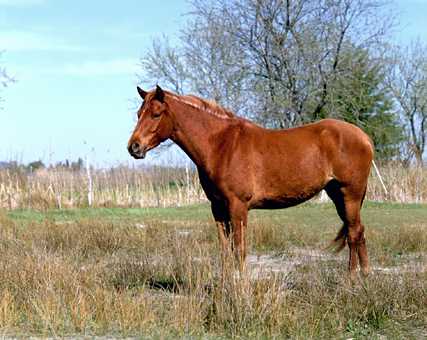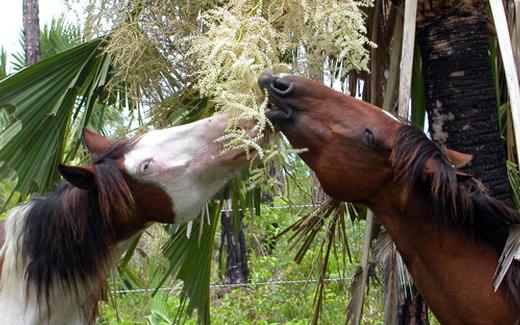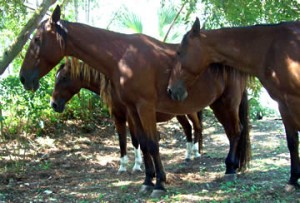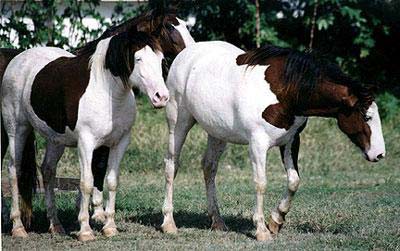



|
Abaco Spanish Colonial Qualities
Formerly known as the The Abaco Barb, The Abaco Spanish Colonial horse, is a medium sized horse of about 13 hands and weighing between 850 and 1000 pounds. It is a purely wild horse; there are only five remaining in the whole world. The sole herd of Abaco Colonials is found in the Bahamas on Great Abaco Island. They are the most critically endangered horse breed in the world. Reproductive issues are being addressed.
Abaco Spanish Colonial Temperament
With a herd of only five horses, personalities vary greatly because they can be so closely observed. It is important to recognize that this is a wild or feral horse and is completely undomesticated. While they do tend to be a calm breed of horse, they are also not accustomed to human interaction and some of the older horses can get a bit aggressive when approached. One of the younger mares seems to exhibit a more friendly attitude around people, while her mother is a bit more skittish.
Abaco Spanish Colonial Appearance
The Abaco horses descended from the Colonial Spanish horses brought into the region by Christopher Columbus. They have displayed numerous colorations including pinto (the rare Overo splashed white), roan, chestnut, and black. The current survivors are strawberry roan, bay with white socks, chestnut, and pinto.
Abaco Spanish Colonial Upkeep
The Abaco Barbs are feral horses and have limited contact with humans, even on their preserve. They eat wild growth such as Shepherd's needle, cow grass, thatch palms, and a number of other wild grasses and plants. They also receive some grains from the preserve keepers because some of their pastures have had to be closed due to an encroaching poisonous weed.
Abaco Spanish Colonial History
These horses were imported from Cuba for logging work in the late 1800’s. They have DNA that is specific to the Colonial Spanish horse and it is known that Christopher Columbus had two horse farms in Cuba). Over the years, the horses grew to be a herd believed to be 200 strong. They worked in the logging camps on Abaco until the horse-drawn equipment was replaced by tractors. These horses, bred for their hardy disposition, were turned loose and survived. Flourishing, they found food and water and shelter until the 1960's when a road stretching from one end of Abaco to the other revealed a number of the old logging roads that had not yet been overgrown. Sadly, the horses became the focus of inappropriate human attention. Many were chased until exhausted by people in cars while others were roped from cars and dragged around. A captured, well trained horse and its owner were giving children rides. The children were warned to not approach the horse alone, without the owner. A child disobeyed and as she climbed on the horse she kicked it. Being trained, it moved off, the child caught her foot in the stirrup and died. The family understood it was not the horse’s fault, but a posse set out to slaughter all the horses, and nearly succeeded. In 1970, three horses were saved and moved to a farm where they shared food and shelter with the cattle kept on the farm. They were cared for until they had grown to 12 heads and then were returned to the wild. By 1992 the herd had grown to 35 horses, only to decrease almost by half to 17 in 1997. In 1999, Hurricane Floyd severely damaged the forest where the horses roamed and they moved themselves to the farm full-time again where they were exposed to herbicides, pesticides, and other poisonous chemicals. At first nothing was thought about it, but after four years of no foaling something was wrong. The horses had grown obese on over rich feed and were not getting enough exercise, so they developed hoof problems. Nature curbed reproduction to save the adults. In 2004 the Bahamas government granted W.H.O.A. (Wild Horses Of Abaco) the conservation group caring for the Abaco Colonials land for a preserve on their old habitat. W.H.O.A. now has an equine veterinarian who is working to support reproduction. There were three pregnancies in 2008 but they were reabsorbed. Not unusual considering what the mares had been through. There still is hope for the herd.
|